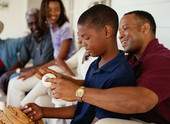
FRIDAY, March 12 (HealthDay News) — Acts of kindness spread rapidly, and it takes only a few people acting cooperatively to influence dozens of others, U.S. researchers report.
They found that when study participants played a game in which they had an opportunity to cooperate with one another, people who received a donation of money were more likely to donate money to other people in future games.
This generated a domino effect in which one person’s generosity spread to three other people and then to nine people that those three people interacted with, and then on to many others as the experiment progressed, said the researchers at the University of California, San Diego, and Harvard Medical School.
This spirit of generosity persists in people who’ve experienced it.
“You don’t go back to being your ‘old selfish self,'” study co-author James Fowler, an associate professor in the political science department at UC San Diego and Calit2’s Center for Wireless and Population Health Studies, said in a news release.
“Though the multiplier in the real world may be higher or lower than what we’ve found in the lab, personally it’s very exciting to learn that kindness spreads to people I don’t know or have never met. We have direct experience of giving and seeing people’s immediate reactions, but we don’t typically see how our generosity cascades through the social network to affect the lives of dozens or maybe hundreds of other people,” Fowler said.
The study was published online in this week’s issue of the Proceedings of the National Academy of Sciences.
More information
Kindness is essential in a healthy relationship. For more, see the Nemours Foundation.

